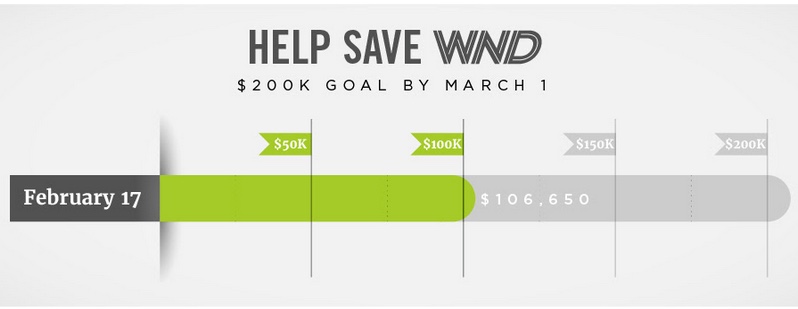Last week, Salon published an article about the apparently impending demise of WorldNetDaily, in which we are quoted pointing out that one major factor in WND’s current financial situation is that its content — heavy on conspiracy theories and fake news — is simply not trusted.
Well, WND editor Joseph Farah took notice. And, being the thin–skinned fellow that he is, he didn’t take it well. So much so, in fact, that he devoted two days’ worth of fundraising pleas to the Salon article.
In his Feb. 15 email letter, Farah complained:
It didn’t take long for the leftist fake-news media sharks to smell WND’s blood in the water because of our pitches for financial help to our subscribers.
Salon.com, one of the worst of the bunch, made the case that WND is suffering the consequences of publishing “fake news.” To make the case, they went back to 2015 to find a sensational headline as the major illustration in their story – and then lied in the caption about what the story said.
Typical.
The WND article in question involved what a “concerned woman” called a “strange image” in a video of an appearance by President Obama in Kenya, which the woman described as a “demon”; the Salon article described the article as “promoting the idea that then-president Barack Obama might be demon-possessed. Farah has sort of a point in that the article doesn’t explicitly state that Obama is demon-possessed. But a link between Obama and malevolent figures is clearly the impression WND wants to leave its readers, as the article’s introduction makes clear:
He’s the U.S. president who has had flies land on his face numerous times, prompting some to call him “Lord of the flies.”
And he has been buzzed by bees.
And has had rodents running across his presidential podium while addressing reporters.
His face has even been compared to the character of Satan the devil in “The Bible” TV miniseries.
And now, a mysterious flash during Barack Obama’s visit to his ancestral homeland of Kenya last month has some people wondering once again about the president’s ties to strange phenomena.
(Actually, the actor who played Satan looks suspiciously like Farah.)
Farah then flip-flopped and conceded that the Salon article “did make a point that has more than a grain of truth,” about the Obama years being more lucrative for WND than the Trump presidency thus far. Farah decided this was the readers’ fault: “Some of the WND audience, to a certain extent I suspect, thinks all the nation’s problems are being solved. So, who needs WND? What those folks are missing is that WND is needed more than ever for the Trump agenda to be realized.”
Later on Feb. 15, Farah devoted his column to attacking not the Salon article but Salon itself, for having benefactors who keep it afloat:
If I had a rich dad who subsidized WND to the tune of millions of dollars a year, even more than all of my company’s annual revenues, I would not be begging for money from WND’s subscribers. That’s what allows Salon to sling mud at WND and other independent media year after year, decade after decade.
According to Wikipedia, which is also known for not being charitable or truthful toward WND, “Salon has been unprofitable through its entire history.”
WND isn’t owned by billionaires. It’s not even owned by multi-millionaires. It’s mostly owned by my wife and me who have invested everything we have in the company – and what we didn’t have we loaned. WND has never lost millions of dollars. It can’t afford to. When revenues dry up, we cut. Sometimes we beg. But we keep slaying dragons no matter what.
Farah conveniently omits the fact that WND did have a millionaire benefactor early in its existence: Robert Beale, who later got busted for tax evasion, then failed to show up for his trial and went on the lam for 14 months, then made things even worse for himself by threatening a judge. Beale is also whom we presumably have to thank for longtime WND columnist Vox Day, the pseudonym of Beale’s son Theodore.
Despite bashing Salon as “a real propagator of real fake news” and describing the article as “lies,” Farah never once identifies anything that’s a lie or fake in the article. Perhaps that’s because Farah would then have to address WND’s own legacy of fake news — which, again, we contend is a major factor in WND’s current death spiral.
Farah then tries to spin turning WND into a Trump fanboy site as a reason it deserves to exist:
I will also admit, WND has not been adversarial toward Trump, like most every other media outlet. So why is traffic down slightly? I suspect it’s because many Republicans and conservatives think Trump’s got everything under control.
Maybe they don’t realize the president is one Democrat-dominated midterm election away from impeachment.
And that is why WND should be an especially important voice in 2018.
Farah headlined this column “Why WND is more successful than Salon.” He doesn’t explain how circling the drain and begging for money from readers equates to “success.”
Farah then sent on his column as the daily fundraising email on Feb. 16, but with an even less accurate headline: “We expose fake news, we don’t manufacture it.”
Oh, yes you do. And if you, Mr. Farah, are afraid to address the issue in an honest manner, WND probably doesn’t deserve to live.
Also of note: As of Feb. 17, WND is only slightly more than halfway to the $200,000 it claims it needs by March 1. That deadline could be a close one.
